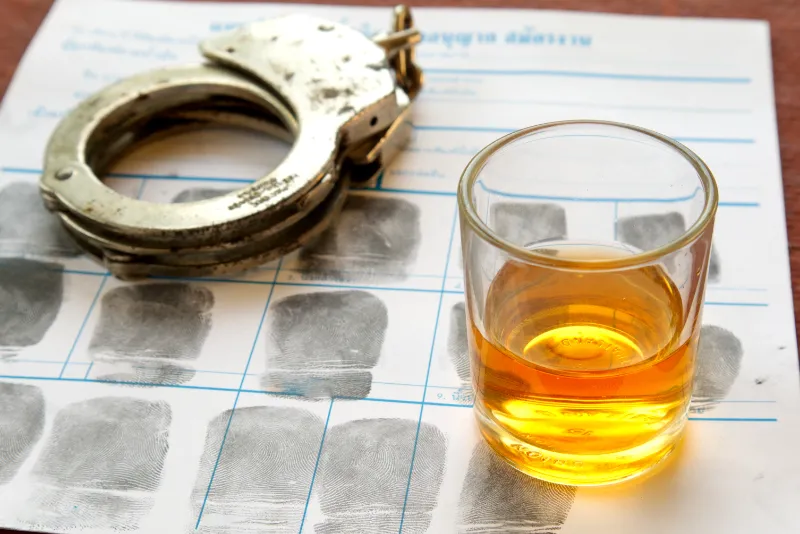
If you are facing DUI charges in Nebraska, there are many defense strategies we can use to dismiss or reduce your charges.
Our firm has handled many DUI cases and we can help defend you! Contact Petersen Criminal Defense Law today to discuss your defense options.
Bad Driving Doesn’t Mean You’re Drunk
Despite common perception and law enforcement myths, people who are not driving under the influence of alcohol or drugs exhibit many of the same driving patterns as drunk drivers.
All sorts of tasks such as texting, talking on a cell phone, changing the radio station, putting on makeup, or eating, distract drivers. The first thing prosecutors focus on is your driving. If you were weaving or speeding then the police will likely testify this is an indication of impairment.
An experienced Omaha DUI attorney will cross-examine the police with their own training manuals and education. Almost all officers are trained using publications from the National Highway Traffic Safety Administration.
There are over 3,400 pages of textbooks used to train law enforcement. Many of them conflict with both indicators and procedures. However, they universally indicate that drivers who are not impaired are guilty of most traffic violations.
The Field Sobriety Tests Are Hard To Perform Sober
The second piece of evidence the prosecutor will focus on is how you performed on the roadside field sobriety tests.
The National Highway Traffic Safety Administration candidly admits that standardized and non-standardized field sobriety tests are difficult to perform without any alcohol or drugs in a person’s system. However, police and prosecutors routinely cite the results of such tests as absolute indicators of impairment. They are not.
Many factors can lead to failed field sobriety tests. Omaha DUI defense attorneys must first look at if the officer performed the test correctly.
For instance, the horizontal gaze nystagmus test is designed to detect an involuntary jerking or bouncing of the eye when the eye is gazed side to side.
The officer holds a pen or other object and has the suspected drunk driver follow it with his or her eyes. The test is supposed to be performed standing, with both hands at your side.
The pen is to be slightly elevated above eye level and moved side to side at a slow and steady rate that should take about 4 seconds. Then the officer holds the object as far over as possible for 4 seconds, then returns to the right other side and then holds the object at 45 degrees relative to each eye. To perform the test properly, the test should take a minimum of 32 seconds.
The majority of HGN tests I watch on police videos are performed incorrectly. The test is performed with the driver seated, too quickly or with the wrong height or angle.
Many factors can lead to a nystagmus that are unrelated to alcohol or drugs such as inner ear infection or outside air temperature relative to the warmth of the car the driver just exited.
The Breath Testing Machine Is Inaccurate
The most convincing evidence is the results of a breath test. The Datamaster breath-testing device is not as accurate as people commonly believe. The device is calibrated using control solutions in a laboratory environment.
The software used to program the machine uses assumptions based on the average human air exchange rate in the lungs and average body mass. Many people, especially in Nebraska, do not conform to the average body mass the machine was designed to test.
The State will rely on the maintenance certification of the Datamaster machine and will state when testing a known solution, the machine returned a result that was within 5% of what it should.
However, Nebraska is a one-test State. Only one test is given and relied on for legal proceedings. The National Safety Council recommends that, when testing human breath, two tests should be given to the same subject within two to ten minutes of each other.
They further contend that the results should be within .02 of each other. On a test of .08 that is, on a second test .10, then it is 22% higher. If the test is .06, it’s a whopping 29% variation.
While the variation in a controlled lab with constant temperature and a known alcohol solution might be 5%, it is clear that the machine is much less accurate in testing human breath.
Juries And Courts Have To Be Educated On The Facts
There is a common perception that if you are arrested for Omaha DUI then you are probably guilty. This is very different from the presumption involved with other types of crimes.
Many judges and juries just want to know the test score to render their verdict. A skilled DUI attorney must overcome this misperception and present non-biased facts to properly defend your Omaha DUI defense case.
Contact Our Nebraska DUI Defense Lawyer Today
If you have been charged with an Omaha, Cass County, or Sarpy County drunk driving offense, contact our Nebraska DUI Defense team today.
Fill out our online contact form for a free evaluation of your case.
